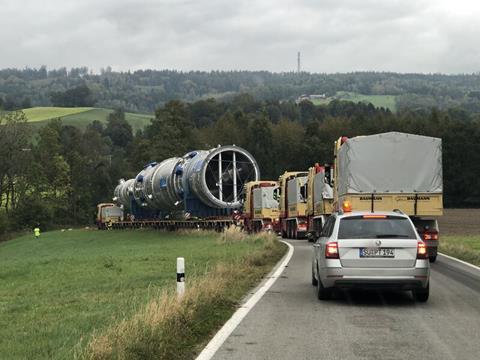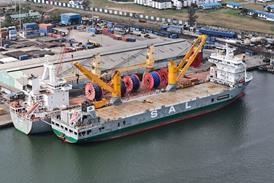The European Association of Abnormal Road Transport and Mobile Cranes (ESTA) has written to the German government and the European Commission urging action to resolve the crisis facing heavy transport in Germany caused by weak infrastructure and long delays in issuing permits.

ESTA director Ton Klijn has called on ministers and commissioners to set out a detailed long-term plan for heavy transport to stop the current situation being repeated in future years. In that letter, he said: “The recent news from northern Germany that the delays in granting permits to heavy and abnormal transport look set to be the norm for many months to come illustrates an outrageous and damaging dereliction of duty by the authorities concerned.
“Central and regional governments – both politicians and officials – and Autobahn GmbH have to date completely failed to recognise the gravity of the situation. They have declined to adopt any immediate, short-term measures to ease this crisis or shown any sign of developing the long-term policies required for an efficient, modern industrial economy.”
He drew attention to the Northwest Branch of Autobahn GmbH, which said it was too busy to reply to emails. A telephone line, which is often busy, can be used to check on permit application status but not expedite their issue.
Klijn continued: “Their long-suffering clients – the abnormal transport companies - have simply been told to be patient and to expect a permit processing time of nine or 10 weeks, instead of nine or 10 days. In fact, the issuance of most permits takes 15 weeks and there is a backlog of about 15,000 pending permit applications.
“We are told that the situation will eventually improve – without any firm evidence whatsoever to back up that assertion. At no point is there any suggestion of serious action to try and improve the situation as it is today. According to Autobahn GmbH, the solution lies in a new automated permit handling system whose development will be accelerated by a few months and which should now go live in July. The current experiences with the dysfunctional VEMAGS system makes us fear the worst.”
HLPFI has reported on the unsuccessful rollout of the VEMAGS system, with key input from ESTA, for the past three years. VEMAGS is the German online system for the application and approval for large-scale and heavy transports across its federal states. One aim was to counter what was described as ‘permit tourism’. Quite frankly, the system has proven disastrous and has led to increased costs, unnecessary bureaucracy and greater delays for heavy transport companies.
Speaking in HLPFI’s July/August Germany 2021 report, Eduard Dubbers-Albrecht, managing partner of Ipsen Logistics said the VEMAGS system requires a lot of paperwork and it can a major task to get a route approved. “If one authority is understaffed, suddenly you do not get the permit. Also, permits are only valid for a certain period of time, so if one takes too long, permits that have been agreed might have expired again. Digitalisation – let’s call it antique, we are not as far ahead as we should be. There is a lot of red tape and paperwork to be done to get these permits to use the road system and that indeed is a major obstacle.”
In the longer-term, Germany’s plans to address the issues seem unrealistic. Klijn said: “On the part of the national authorities, we only hear statements about unrealistic plans to shift abnormal transport to railways (which are already overloaded) and to inland waterways (whose infrastructure in Germany may be in even worse condition than the road network).
“Can we suggest an agreed programme of infrastructure investment, the development of agreed heavy transport routes, the creation of an agreed Europe-wide electronic permitting system, and common rules and regulations on the size and weight of loads (along with the rules on marking and lighting and escort cars)?”
None of the above suggestions are fanciful, but do require ambition to achieve, he added. “But if the authorities continue to turn a deaf ear to these very real problems, German and European industry will suffer great harm. This is, we stress, not just an issue for German companies but for Europe as a whole.”
















